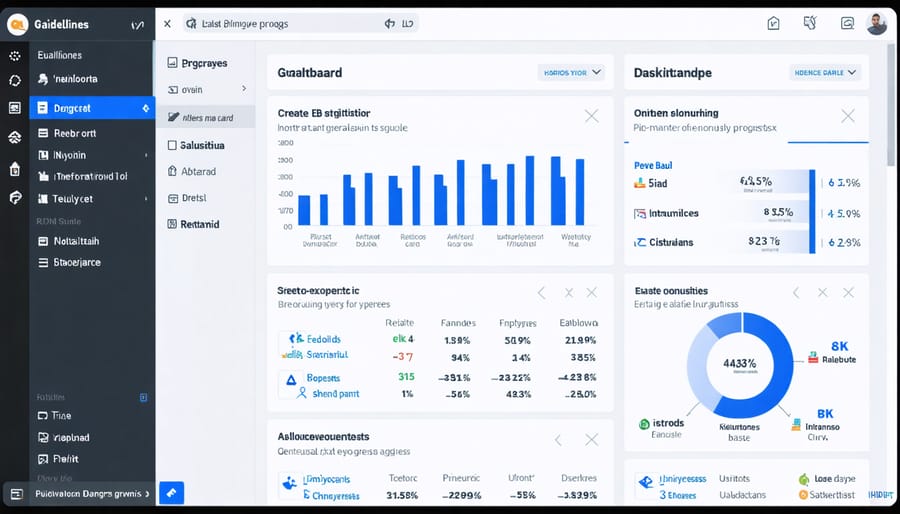Digital upskilling stands as a critical imperative for Canadian businesses navigating today’s technology-driven marketplace. As automation and artificial intelligence reshape traditional roles, organizations must prioritize digital skills training initiatives to remain competitive and ensure workforce readiness.
Recent data from the Information and Communications Technology Council reveals that 55% of Canadian businesses face significant skills gaps in their digital capabilities. This shortage costs the Canadian economy an estimated $2.5 billion annually in lost productivity and missed opportunities. However, companies that implement strategic upskilling programs report a 25% increase in employee productivity and a 30% reduction in turnover rates.
For Canadian organizations, digital upskilling represents more than just technical training—it’s a fundamental business transformation strategy. By equipping employees with advanced digital competencies, from data analytics to cloud computing, businesses position themselves to leverage emerging technologies, enhance operational efficiency, and drive innovation in an increasingly competitive global market.
This transformation requires a structured approach to skill development, clear alignment with business objectives, and a commitment to continuous learning. As we explore effective strategies for digital upskilling, we’ll focus on practical solutions tailored to the Canadian business landscape.
The Digital Skills Gap in Canadian Workplaces
Key Digital Skills in Demand
As Canadian organizations accelerate their digital transformation initiatives, certain digital skills in demand have emerged as crucial for business success. Data analytics tops the list, with organizations seeking professionals who can translate complex data into actionable insights. Cloud computing expertise follows closely, as businesses increasingly migrate their operations to digital platforms.
Cybersecurity skills have become non-negotiable, with the rising importance of protecting sensitive information and maintaining customer trust. Digital marketing and social media management capabilities are essential for maintaining competitive advantage, while artificial intelligence and machine learning knowledge is increasingly valued across industries.
Project management in digital environments and proficiency in collaboration tools have become fundamental, especially with the rise of remote work. According to the Information and Communications Technology Council (ICTC), skills in automation and robotics process automation (RPA) are also gaining prominence across manufacturing and service sectors.
These core competencies are not just technical requirements but strategic assets that drive innovation and growth in Canadian businesses.

Impact on Business Performance
Digital skills gaps significantly impact business performance across Canadian industries, affecting both productivity and competitive advantage. Research by the Information and Communications Technology Council (ICTC) shows that organizations with strong digital capabilities consistently outperform their peers by up to 26% in revenue growth.
Companies experiencing digital skills shortages often face increased operational costs, delayed project implementations, and missed market opportunities. A recent study by the Business Development Bank of Canada found that 48% of small and medium enterprises report lower productivity due to digital skills gaps in their workforce.
Success stories like Toronto-based Shopify demonstrate the power of prioritizing digital upskilling. By investing in comprehensive digital training programs, they’ve achieved a 30% increase in employee productivity and maintained their position as a global e-commerce leader.
“Digital skills are no longer optional – they’re fundamental to business survival and growth,” notes Sarah Thompson, Chief Technology Officer at RBC. “Organizations that fail to address skills gaps risk falling behind in an increasingly digital marketplace.”
Companies that implement robust digital training programs report improved customer satisfaction, enhanced innovation capabilities, and stronger employee retention rates.

HR’s Role in Digital Transformation
Assessment and Planning
Effective digital upskilling begins with a comprehensive assessment of your organization’s current digital capabilities and future needs. Start by conducting a skills gap analysis through employee surveys, performance reviews, and industry benchmark comparisons. This evaluation should identify both technical competencies and digital literacy levels across different departments.
Create a skills matrix that maps existing capabilities against desired outcomes, considering both immediate operational requirements and long-term strategic goals. Focus on core digital competencies such as data analytics, cloud computing, cybersecurity, and digital marketing, while also considering soft skills like digital collaboration and adaptive thinking.
When designing your upskilling program, adopt a phased approach. Begin with foundational digital skills that apply across roles, then progress to specialized training for specific positions. Consider implementing a combination of learning methods:
– Self-paced online courses
– Instructor-led workshops
– Peer-to-peer learning sessions
– Hands-on project work
– Mentorship programs
Track progress through regular assessments and adjust the program based on feedback and changing business needs. Set clear, measurable objectives and establish key performance indicators (KPIs) to evaluate the effectiveness of your upskilling initiatives.
Many Canadian organizations have found success by partnering with educational institutions and technology providers to develop customized training programs. Consider leveraging government funding and incentives available for workplace digital skills development to maximize your investment in employee growth.
Implementation Strategies
Successfully implementing digital upskilling programs requires a well-structured approach that aligns with your organization’s digital transformation strategies. Start by conducting a thorough skills assessment to identify gaps in your workforce’s digital capabilities. This baseline measurement will help create targeted training programs that address specific needs.
Break down the implementation into manageable phases, beginning with pilot programs for smaller teams before rolling out company-wide initiatives. Leverage a mix of learning formats, including online courses, hands-on workshops, and mentorship programs, to accommodate different learning styles and schedules.
Partner with established educational institutions and technology providers to access high-quality training materials and certification programs. Many Canadian organizations have found success by collaborating with local tech companies and colleges to develop customized training solutions.
Ensure active engagement by incorporating gamification elements and creating clear progression paths. Track progress through regular assessments and adjust programs based on feedback and results. Consider implementing a “digital champions” program, where early adopters can support and motivate their colleagues.
Maintain momentum by celebrating successes and sharing positive outcomes across the organization. Regular communication about program benefits and achievement milestones helps sustain enthusiasm and participation. Remember to measure ROI through improved productivity metrics and employee satisfaction surveys to demonstrate program value.
Successful Digital Upskilling Programs
Corporate Success Stories
Several Canadian companies have demonstrated remarkable success in digital upskilling initiatives, setting benchmarks for others to follow. TD Bank Group, for instance, launched its Future Ready program in 2019, successfully training over 85,000 employees in digital skills and emerging technologies. The program achieved a 92% completion rate and significantly improved employee retention through upskilling.
Shopify’s Dev Degree program represents another notable achievement, combining work experience with academic learning. The four-year program has enabled the company to build a robust talent pipeline while providing participants with hands-on experience in software development and digital commerce.
Rogers Communications implemented a comprehensive digital transformation strategy that included upskilling 25,000 employees across various departments. Their initiative focused on data analytics, cloud computing, and digital customer service, resulting in a 40% increase in digital literacy scores among participants.
British Columbia’s tech giant Absolute Software developed a peer-learning program where digitally proficient employees mentor colleagues in new technologies. This approach has proven particularly effective, with 78% of participants reporting improved confidence in using digital tools within six months.
These success stories share common elements: clear objectives, structured implementation, measurable outcomes, and strong leadership support. According to the Information and Communications Technology Council of Canada, companies that invested in digital upskilling programs saw an average 23% improvement in productivity and a 35% reduction in technical skill gaps within the first year of implementation.
Measuring ROI
Measuring the return on investment (ROI) of digital upskilling initiatives requires a comprehensive approach that combines quantitative metrics with qualitative assessments. Leading Canadian companies track success through key performance indicators (KPIs) such as productivity improvements, error reduction rates, and employee retention statistics.
According to the Canadian Digital Learning Research Association, successful organizations typically establish baseline measurements before implementing upskilling programs and conduct regular assessments at 3, 6, and 12-month intervals. These assessments often include:
• Completion rates of training programs
• Pre and post-training skill assessments
• Employee satisfaction surveys
• Time savings in daily operations
• Reduction in external consultant costs
• Implementation of new digital tools
• Revenue generated from new digital capabilities
TD Bank Group, for example, reported a 27% increase in employee productivity after implementing their digital upskilling program, while also seeing a 35% reduction in training costs through their innovative digital learning platform.
To effectively measure ROI, companies should:
1. Set clear, measurable objectives aligned with business goals
2. Track both direct and indirect benefits
3. Monitor employee engagement and application of new skills
4. Calculate cost savings from reduced turnover and hiring needs
5. Measure improved customer satisfaction rates
Organizations like RBC have developed sophisticated tracking systems that combine traditional metrics with AI-powered analytics to measure skill development progress. Their approach has shown that for every dollar invested in digital upskilling, they receive approximately $2.50 in return through increased efficiency and innovation.
Expert tip: Focus on both short-term wins and long-term value creation when measuring ROI, as some benefits may take time to materialize fully.

Resources and Support
Government Initiatives
The Canadian government has implemented several key initiatives to support digital upskilling across the country. The Canada Digital Adoption Program (CDAP) offers grants of up to $15,000 to small and medium-sized enterprises for digital transformation projects, including employee training and skills development.
At the provincial level, Ontario’s Skills Development Fund provides funding for innovative training projects, while British Columbia’s Innovator Skills Initiative offers wage subsidies for businesses hiring students in digital roles. Quebec’s Programme Actions Concertées pour le Maintien en Emploi (PACME) supports workplace training initiatives with a focus on digital competencies.
The federal CanCode program, with an investment of $110 million, focuses on building digital skills among Canadian youth and educators. Additionally, the Future Skills Centre funds various digital upskilling projects across different sectors, ensuring workforce readiness for emerging technologies.
Employment and Social Development Canada (ESDC) offers the Skills for Success program, which includes digital literacy as a core component. This initiative provides resources and funding for organizations to deliver digital skills training to their employees.
These government programs often partner with industry leaders and educational institutions to create comprehensive training solutions. Businesses can leverage multiple funding sources simultaneously, maximizing their investment in digital upskilling while building a more competitive workforce.
Technology Partners
Canadian organizations are increasingly partnering with leading technology companies to facilitate digital upskilling initiatives. Microsoft Canada’s Skills for Success program has become a cornerstone for many businesses, offering specialized training paths and certification opportunities in cloud computing and data analytics. Similarly, Google Canada provides tailored learning solutions through its Digital Skills for Business platform, helping organizations bridge specific technical gaps.
The Innovation Hub at Shopify has emerged as a valuable partner for Canadian businesses, offering hands-on experience with e-commerce technologies and digital marketing tools. Their partnership programs specifically cater to small and medium-sized enterprises looking to enhance their digital capabilities.
Amazon Web Services (AWS) has established strong relationships with Canadian educational institutions and businesses through their AWS Educate and AWS Skills Guild programs. These initiatives provide comprehensive cloud training and certification pathways for employees at all skill levels.
Local technology accelerators like MaRS and Communitech have also stepped up to offer specialized digital training programs. They connect businesses with expert mentors and provide access to cutting-edge tools and technologies. These partnerships often include practical workshops, mentorship opportunities, and real-world project experience.
Companies can also leverage partnerships with Canadian colleges and universities that offer customized corporate training programs in digital skills. These institutions work closely with industry partners to develop curriculum that aligns with current market needs and technological trends.
In today’s rapidly evolving business landscape, digital upskilling has become a critical imperative for Canadian organizations. HR professionals play a pivotal role in driving this transformation and ensuring their workforce remains competitive in the digital age.
Success in digital upskilling initiatives requires a well-planned, systematic approach that combines strategic vision with practical implementation. Key takeaways include the importance of conducting thorough skills gap analyses, developing customized learning pathways, and leveraging both internal and external resources to build comprehensive training programs.
To effectively implement digital upskilling in your organization, consider these action steps:
1. Start by assessing your current digital capabilities and identifying priority areas for development
2. Create a clear roadmap with measurable objectives and timeline
3. Secure leadership buy-in and adequate budget allocation
4. Choose appropriate learning platforms and tools that align with your organization’s needs
5. Implement regular progress monitoring and feedback mechanisms
6. Celebrate and showcase success stories to maintain momentum
Remember that digital upskilling is an ongoing journey rather than a destination. Stay informed about emerging technologies and industry trends, and continuously adapt your training programs to meet evolving needs. By taking a proactive approach to digital skills development, HR professionals can help create resilient, future-ready organizations that thrive in the digital economy.
Success lies in maintaining a balance between immediate skill requirements and long-term capability building, always keeping employee engagement and organizational goals at the forefront of your digital upskilling strategy.
